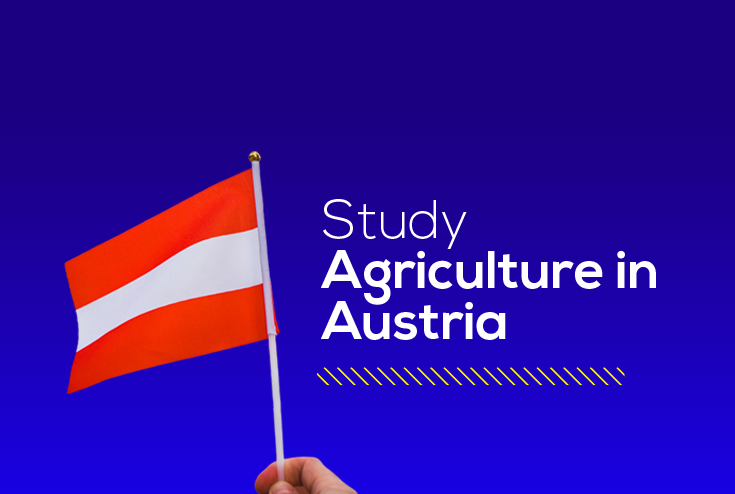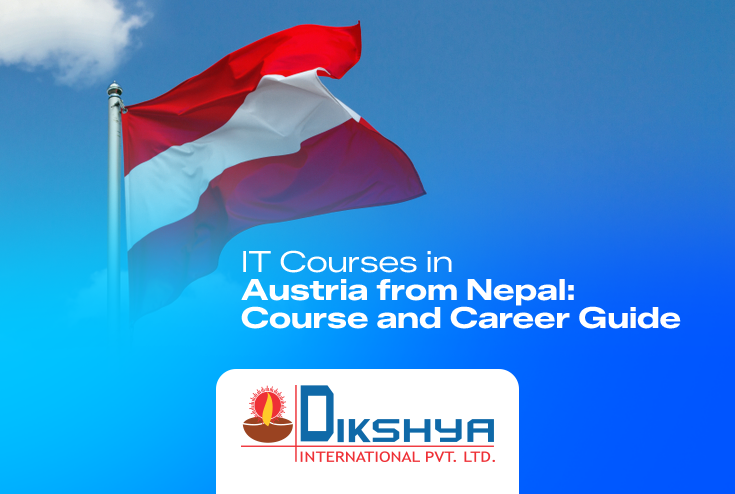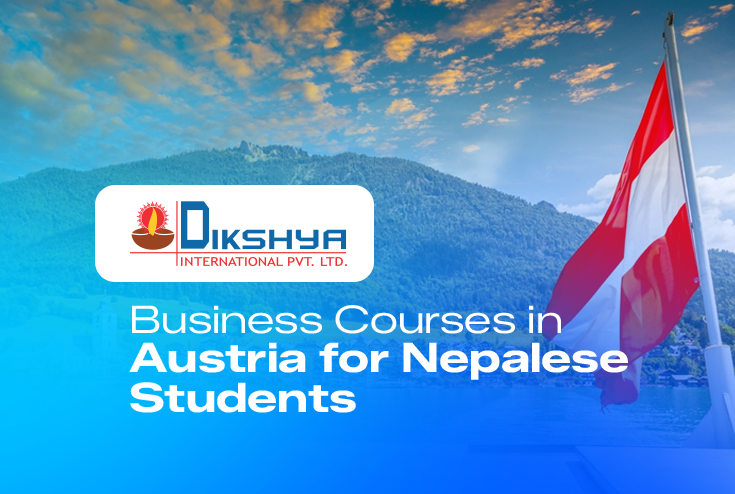
Study Agriculture in Austria | Complete Visa Guide from Nepal in 2026
Austria has emerged as one of Europe's premier destinations for agricultural education, offering world-class programs that blend traditional farming wisdom with cutting-edge agricultural technology. For Nepali students passionate about agriculture, Austria presents an exceptional opportunity to gain internationally recognized qualifications while experiencing innovative farming practices in the heart of Europe.
Table of Contents
- Why Choose Austria for Agricultural Studies?
- Top Universities for Agricultural Studies in Austria
- University of Natural Resources and Life Sciences Vienna (BOKU)
- University of Innsbruck - Faculty of Biology
- Vienna University of Technology (TU Wien)
- University of Veterinary Medicine Vienna
- Agriculture Programs and Degrees Available in Austria
- Admission Requirements to Study Agriculture in Austria
- Application Process and Timeline of Austria for International Students
- Application Timeline
- Step-by-Step Application Process
- Costs and Expenses Involved in Studying Agriculture in Austria
- Scholarships and Financial Aid Opportunities for International Students in Austria
- Student Visa Process of Austria from Nepal
- Student Life and Culture in Austria
- Cultural Adaptation
- Support Services
- Work Opportunities for Students
- Career Opportunities and Job Market After Completing Agriculture Studies from Austria
- Growing Agricultural Sectors
- Post-Graduation Work Options
- Entrepreneurship Opportunities
- Future Prospects and Industry Trends in Austrian Agriculture Industry
- Emerging Fields in Austrian Agriculture
- Relevance to Nepal
- Conclusion
- FAQs - Study Agriculture in Austria from Nepal
Why Choose Austria for Agricultural Studies?
Academic Excellence
Austria's agricultural education system is renowned globally for its research-oriented approach and practical application. The country's universities consistently rank among the top institutions for agricultural sciences, offering programs that address modern challenges like climate change, sustainable farming, and food security.
Innovation Hub
Austria leads Europe in sustainable agriculture and organic farming practices. Students get hands-on experience with:
- Precision agriculture technologies
- Sustainable farming methods
- Renewable energy in agriculture
- Modern greenhouse systems
- Agricultural biotechnology
Strategic Location
Located in Central Europe, Austria provides easy access to diverse agricultural markets and practices across the continent, offering students exposure to different farming systems and agricultural policies.
Top Universities for Agricultural Studies in Austria
1. University of Natural Resources and Life Sciences Vienna (BOKU)
Location: Vienna
Founded: 1872
Global Ranking: Top 200 worldwide for Agricultural Sciences
BOKU is Austria's premier institution for agricultural education and the most popular choice among international students.
Popular Programs:
- Agricultural Sciences (Bachelor's/Master's)
- Sustainable Agricultural Systems
- Biotechnology
- Forestry Sciences
- Food Science and Technology
- Landscape Architecture
- Environmental Engineering
Why Nepali Students Choose BOKU:
- Strong research focus on mountain agriculture (relevant to Nepal's geography)
- International student community with support services
- English-taught Master's programs
- Excellent industry connections
2. University of Innsbruck - Faculty of Biology
Location: Innsbruck (Alpine region)
Specializations:
- Alpine ecology and mountain agriculture
- Plant sciences
- Environmental biology
- Agricultural genetics
Advantages for Nepali Students:
- Mountain agriculture expertise similar to Nepal's terrain
- Research opportunities in high-altitude farming
- Strong focus on climate-resilient agriculture
3. Vienna University of Technology (TU Wien)
Location: Vienna
Agricultural-Related Programs:
- Agricultural Engineering
- Food Process Engineering
- Environmental Technology
- Renewable Energy Systems
4. University of Veterinary Medicine Vienna
Location: Vienna
Programs:
- Veterinary Medicine
- Animal Sciences
- Livestock Management
- Animal Nutrition
Agriculture Programs and Degrees Available in Austria
Bachelor's Programs (3-4 years)
- Agricultural Sciences - Comprehensive foundation in crop production, soil science, and farm management
- Forestry Sciences - Forest management, wood technology, and environmental conservation
- Food Science and Biotechnology - Food processing, quality control, and biotechnology applications
- Landscape Architecture - Sustainable land use and agricultural landscape design
Master's Programs (2 years)
- Sustainable Agricultural Systems - Focus on eco-friendly farming practices
- Organic Agricultural Systems - Specialized training in organic farming
- Mountain Forestry - Relevant for Nepal's mountainous terrain
- Agricultural and Food Economics - Business aspects of agriculture
- Plant Sciences - Advanced crop breeding and plant biotechnology
- Animal Sciences - Livestock production and animal welfare
PhD Programs (3-4 years)
- Research-based programs in all agricultural disciplines
- Strong funding opportunities for international students
- Collaboration with European research networks
Admission Requirements to Study Agriculture in Austria
Academic Requirements
For Bachelor's Programs:
- Completed higher secondary education (10+2) with science subjects
- Minimum GPA requirement varies (typically 3.0/4.0 or equivalent)
- Strong background in biology, chemistry, and mathematics preferred
For Master's Programs:
- Bachelor's degree in agriculture, biology, or related field
- Minimum GPA of 3.0/4.0 or equivalent
- Relevant academic background in chosen specialization
For PhD Programs:
- Master's degree in relevant field
- Research proposal
- Supervisor agreement from Austrian university
Language Requirements
German Programs:
- German proficiency: B2 level minimum (DSH-2, TestDaF 4, or equivalent)
- Some programs may accept C1 level German
English Programs:
- IELTS: 6.5 overall (6.0 in each section)
- TOEFL iBT: 80+ overall
Additional Requirements
- Statement of Purpose
- Letters of Recommendation (2-3)
- CV/Resume
- Portfolio (for landscape architecture programs)
Application Process and Timeline of Austria for International Students
Application Timeline
For September Intake:
- Application Opens: November (previous year)
- Application Deadline: February 15 - March 15
- Decision Notification: May - June
- Visa Application: June - July
- Departure: August
Step-by-Step Application Process
Step 1: Research and Program Selection
- Choose your preferred university and program
- Verify admission requirements
- Check language requirements
Step 2: Document Preparation
- Academic transcripts (officially translated)
- Degree certificates
- Language proficiency certificates
- Statement of Purpose
- Letters of recommendation
- Financial proof
Step 3: Online Application
- Submit application through university portals
- Pay application fees (€50-200)
- Upload required documents
Step 4: Interview (if required)
- Some programs require Skype/Zoom interviews
- Prepare for technical questions in your field
Step 5: Acceptance and Visa Application
- Accept offer and pay deposit
- Apply for student residence permit
- Arrange accommodation and travel
Costs and Expenses Involved in Studying Agriculture in Austria
Tuition Fees
1. EU/EEA Students:
- Public Universities: €726.72 per semester
- Private Universities: €3,000-15,000 per year
2. Non-EU Students (including Nepal):
- Public Universities: €1,500 per semester (€3,000 per year)
- Private Universities: €8,000-25,000 per year
Living Expenses (Monthly)
- Accommodation: €300-600
- Student dormitories: €300-450
- Shared apartments: €400-600
- Studio apartments: €500-800
- Food: €200-350
- Cooking at home: €200-250
- Including occasional dining out: €300-350
- Transportation: €50-75
- Student discounts available
- Bicycle-friendly cities
- Health Insurance: €65-80 (mandatory)
- Personal Expenses: €100-200
- Books, clothing, entertainment
Total Monthly Cost: €715 - 1,305 and Annual Living Cost: €8,580 - 15,660
Scholarships and Financial Aid Opportunities for International Students in Austria
Government Scholarships
1. Austrian Development Cooperation (ADC) Scholarships
- Full scholarships for developing countries including Nepal
- Covers tuition fees, living expenses, and travel costs
- Application deadline: Usually March
- Eligibility: Bachelor's degree, relevant work experience preferred
2. Ernst Mach Grant
- Partial scholarships for Master's and PhD students
- Monthly stipend: €940 (Master's), €1,040 (PhD)
- Duration: 1-9 months
- Application through Austrian universities
University-Specific Scholarships
BOKU Scholarships:
- Merit-based scholarships for international students
- Tuition fee waivers and living allowances
- Research assistantships for PhD students
Private Foundation Scholarships:
- Various Austrian foundations offer scholarships
- Field-specific funding opportunities
- Application requirements vary
External Scholarships
1. ERASMUS+ Scholarships
- For students from partner universities
- Exchange programs with European institutions
- Monthly allowance: €500 - 800
2. DAAD Scholarships
- Available for some Austria-Germany programs
- Research grants and study scholarships
Student Visa Process of Austria from Nepal
Visa Types
- Student Visa (Type D): For programs longer than 6 months
- Student Residence Permit: Applied after arrival for longer stays
Required Documents
- Valid passport (6+ months validity)
- University admission letter
- Financial proof (€6,000-12,000 in bank account)
- Health insurance coverage
- Academic certificates
- Clean criminal record certificate
- Passport photos
- Visa application form
Application Process
- Apply at Austrian Embassy/Consulate in Nepal
- Location: Austrian Honorary Consulate, Kathmandu
- Processing time: 6-8 weeks
- Visa fee: €150
- Documents Submission
- All documents must be officially translated
- Apostille certification required for some documents
- Interview
- Personal interview may be required
- Questions about study plans and financial situation
Student Life and Culture in Austria
Cultural Adaptation
Austria offers a welcoming environment for international students, with strong support systems in place.
Language:
- German is the official language
- English widely spoken in academic settings
- Free German courses available for international students
Social Life:
- Active student organizations
- Cultural festivals and events
- Outdoor activities (hiking, skiing)
- International student communities
Support Services
- International Student Offices
- Buddy programs for new students
- Career counseling services
- Academic support and tutoring
- Mental health and counseling services
Work Opportunities for Students
- Up to 20 hours per week during studies
- Full-time during semester breaks
- Hourly wages: €8 - 15
- Popular jobs: Tutoring, research assistance, hospitality
Career Opportunities and Job Market After Completing Agriculture Studies from Austria
Growing Agricultural Sectors
Austria's agricultural sector is expanding in several key areas:
1. Sustainable Agriculture
- Organic farming operations
- Sustainable crop management
- Environmental consulting
2. Agri-Technology
- Precision farming solutions
- Agricultural software development
- Farm automation systems
3. Food Industry
- Food processing companies
- Quality control and safety
- Product development
4. Research and Development
- Agricultural research institutions
- Biotechnology companies
- Environmental consulting firms
Post-Graduation Work Options
Red-White-Red Card Plus:
- 6 months job search period after graduation
- Path to permanent residence
- Access to entire EU job market
Career Prospects:
- Agricultural Engineer: €35,000 - 55,000 annually
- Food Technologist: €32,000 - 48,000 annually
- Agricultural Consultant: €38,000 - 60,000 annually
- Research Scientist: €40,000 - 70,000 annually
Entrepreneurship Opportunities
Austria supports agricultural startups through:
- Government funding programs
- Business incubation centers
- Agricultural technology hubs
- Access to EU markets
Future Prospects and Industry Trends in Austrian Agriculture Industry
Emerging Fields in Austrian Agriculture
- Climate-Smart Agriculture
- Adaptation strategies for climate change
- Drought-resistant crop varieties
- Sustainable water management
- Precision Agriculture
- IoT sensors and monitoring systems
- Drone technology for crop monitoring
- Data analytics in farming
- Vertical Farming
- Indoor agriculture systems
- Urban farming solutions
- Controlled environment agriculture
- Agricultural Biotechnology
- Plant breeding innovations
- Biofortification programs
- Sustainable pest management
Relevance to Nepal
Austrian agricultural expertise is particularly relevant to Nepal's challenges:
- Mountain agriculture techniques
- Sustainable farming practices
- Climate-resilient crop varieties
- Small-scale farming optimization
- Organic farming methods
Nepali students can return with knowledge and skills to:
- Improve agricultural productivity in Nepal
- Introduce sustainable farming practices
- Develop agribusiness opportunities
- Contribute to food security initiatives
- Lead agricultural research projects
Conclusion
Studying agriculture in Austria offers Nepali students an exceptional opportunity to gain world-class education in a country renowned for its agricultural innovation and sustainability practices. With strong universities like BOKU Vienna, comprehensive scholarship opportunities, and a supportive environment for international students, Austria presents an ideal destination for agricultural education.
The combination of theoretical knowledge, practical experience, and exposure to cutting-edge agricultural technologies makes Austrian agricultural education highly valuable. Graduates are well-prepared to contribute to global food security challenges and can bring innovative solutions back to Nepal's agricultural sector.
For Nepali students passionate about agriculture and seeking international exposure, Austria offers not just education but a transformative experience that can shape successful careers in the evolving global agricultural landscape.
Ready to start your agricultural journey in Austria? Begin by researching specific programs at Austrian universities, preparing for language proficiency tests, and connecting with current Nepali students studying agriculture in Austria. Your path to becoming an agricultural leader starts with taking the first step toward this exciting opportunity.
Contact Us for the Detailed Information Regarding Opportunities in Austria:
Dikshya International Education
Located at: Dillibazar Height, Kathmandu and Kalika Chowk, Butwal
Email Address: info@dikshyaintl.com
FAQs - Study Agriculture in Austria from Nepal
1. Is education free in Austria for Nepali students?
No, education is not free for Nepali students. As non-EU students, Nepali students pay €1,500 per semester (€3,000 annually) at public universities. However, scholarships like ADC and Ernst Mach grants can cover these costs completely or partially.
2. What is the agriculture scope in Austria?
Austria offers excellent agricultural career scope in sustainable farming, organic agriculture, agri-technology, food processing, and research. Key sectors include precision agriculture, biotechnology, environmental consulting, and food safety. Post-graduation work permits allow 6 months job search with salaries ranging €32,000 - 70,000 annually.
3. How much GPA is required to study in Austria from Nepal?
A minimum GPA of 2.80 is required for the admissions to bachelor’s and master’s degree. However, the competitive programs at highly reputed universities may require GPAs higher than 3.25.
4. Which country is best for agricultural science study?
The top countries for agricultural studies are:
- Netherlands - Advanced technology and research
- Germany - Strong industrial agriculture
- Austria - Sustainable and mountain agriculture
- Australia - Large-scale farming and agribusiness
- Denmark - Agricultural innovation and sustainability
Austria ranks among the top 5 for sustainable agriculture and mountain farming expertise.
5. Which country is No. 1 in agriculture?
- By agricultural output: China leads globally, followed by India and USA.
- By agricultural technology and innovation: Netherlands is considered #1 due to the highest agricultural productivity per hectare and advanced greenhouse technologies.
- By agricultural education quality: Netherlands, Germany, and Austria lead rankings.
6. Which major is best in agriculture?
Some of the most promising agricultural majors include:
- Sustainable Agricultural Systems - High demand, environmental focus
- Agricultural Technology/Precision Agriculture - Growing field with tech integration
- Food Science and Technology - Strong industry demand
- Agricultural Economics/Agribusiness - Business and management opportunities
- Plant Sciences/Biotechnology - Research and innovation focus
For Nepali students specifically: Sustainable Agricultural Systems and Mountain Agriculture are most relevant due to Nepal's geography and development needs.
Also Read: Study in Austria from Nepal: Complete Guide 2025
Cost to Study in Austria: Tuition, Visa & Living





Get Guidance